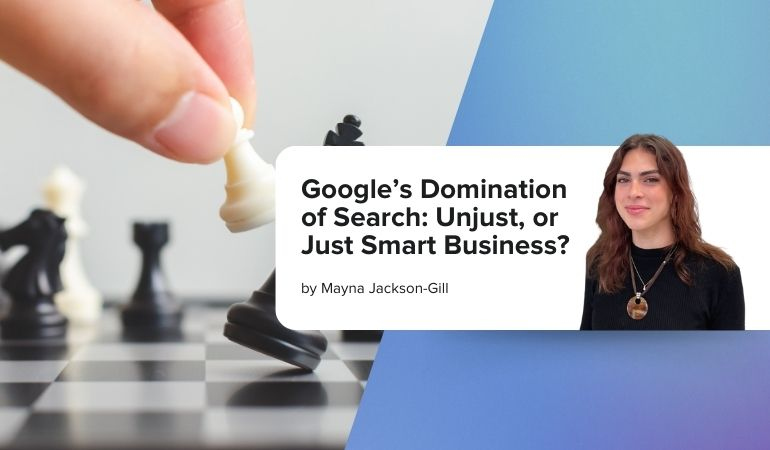Becoming a market leader is a dream for any business. It means you have power, and with power comes control.
Google exemplifies this dominance in the search engine industry, enabling it to dictate market dynamics and consumer choices. But when does the level of control cross the line?
Google's Monopoly Power: The Google Antitrust Lawsuit Explained
A recent lawsuit against Google by the US Justice Department suggests that Google's rise to monopoly status did not stem from superior quality; It involved the illegal exploitation of its monopoly power, violating antitrust on multiple fronts.
In fact, it’s not the first time Google has faced legal fines for antitrust violations - Google has been involved in three previous cases related to this matter.
Why is Google a Monopoly?
Google owns roughly 90% of the search market.
However, it maintains its monopoly not by offering a better product, but by closing nearly every alternative gap in the market. Exclusive partnerships with major companies like Apple, Samsung, and Mozilla ensure that it remains the default search engine on millions of devices sold around the world.
The financial side of this deal is significant. These billion-dollar deals provide Apple, Samsung and Mozilla with significant income and it’s something that competitors simply cannot match.
In Apple’s case, testimony from the current Global Partnerships Executive, Joan Braddi suggested that their partnership was first formed in 2002 with no financial exchange involved. However, in 2007 an ulterior motive was unveiled in an email sent to Braddi from colleague, Jeff Shardell:
No default placement — no revenue share on Safari/Windows.
Essentially, it was a case of ‘you scratch my back, I’ll scratch yours’. By securing this deal, Google strengthens its already dominant market share.
Impact on Search
With the introduction of Google’s Search Generative Experience, the traditional search engine results page (SERP) is becoming outdated.
Instead of scrolling through results pages to find what you are looking for, you can now simply type a query and have the answer (along with other relevant info) presented straight to you. Sounds great right?
Maybe not so much; people are seeing a rise in paid ads and a greater emphasis on Google’s own services.
Businesses must adapt their search strategies to account for this new landscape through a new concept referred to as ‘AIO’, or Artificial Intelligence Optimisation.
I believe content will now exist despite its delivery method. An article may exist on a webpage, but it will also exist in the ‘mind’ of an AI agent.
- Paul Wood, Director
With more ads being displayed, businesses may face heightened competition for visibility in SERPs, adding to Google’s case of prioritising generating revenue through ads rather than enhancing search quality. This could lead to increased advertising costs as companies bid for top ad placements.
Alongside traditional ads, Google is prominently featuring its own services, such as Google Maps and Google Shopping, within search results - diverting traffic away from competitors and into Google's ecosystem.
The Cost of Market Dominance: The Impact on Innovation
By creating an almost indestructible barrier to entry, the lack of competition can lead to a lack of innovation as the market leader faces little pressure to innovate..
We all enjoy Google's convenience, but over time, I wonder if the effects of this market monopoly will become clearer.
What’s Next?
As of August 5th 2024, the trial judge ruled the following conclusion:
Google is a monopolist, and it has acted as one to maintain its monopoly. It has violated Section 2 of the Sherman Act.
Despite a conclusion being made, this is only the tip of the iceberg. Now, representatives from Google and the Department of Justice will argue this monopoly status, as well as discussing steps to restore competition.
So far, the DoJ has considered the following ‘behavioural and structural remedies’:
- Google makes the data that drives its search engine available to competitors, as shared data can stimulate competition and innovation.
- The termination of contracts with big names like Apple will mean safari searches will no longer be automatically executed by Google, and users will therefore have a choice.
- More severely, the separation of Google from other Google products, such as Android, Chrome and Google Play, to prevent the company from further preferencing its own products.
As the case unfolds, it will be interesting to see how the proposed remedies could reshape the search industry.





